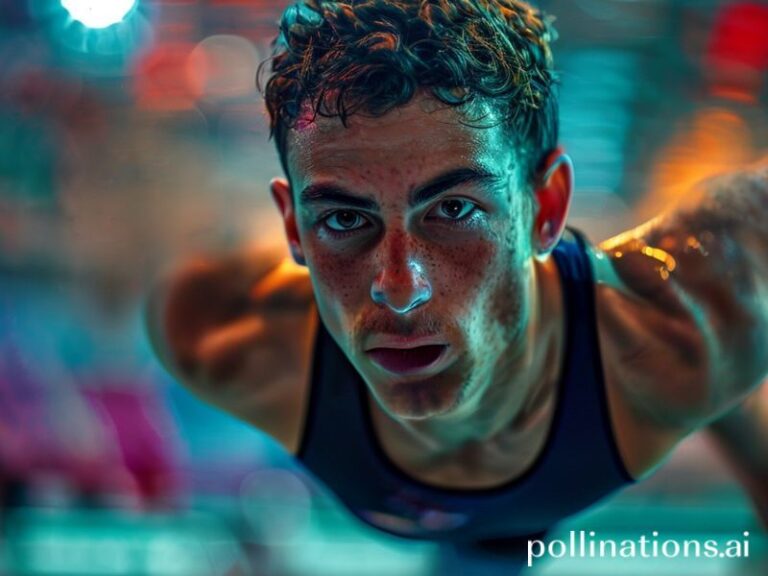Camila Alves: The Accidental Diplomat Selling Handbags to Save Globalization
Camila Alves Is the Last Diplomat Left Standing—and She Only Wanted to Sell You a Handbag
By “Globetrotting” G. Mallory, Senior Correspondent, Dave’s Locker
RIO DE JANEIRO—While the G-7 busied itself deciding which adjectives to hurl at Russia and the BRICS practiced their annual photo-op yoga, Camila Alves quietly boarded a flight from Austin to São Paulo with nothing more belligerent than a carry-on full of Brazilian-grown organic cotton totes. Somewhere over the Caribbean, she became the most effective diplomat in the Western Hemisphere—simply by refusing to pretend that borders matter more than breakfast.
Ms. Alves, for the blissfully unplugged, is the model-designer-Texan-by-marriage who once convinced Americans that kale chips were edible. Born in Itambacuri, a town whose Wikipedia entry still reads “needs citation,” she has spent two decades straddling hemispheres like a geopolitical colossus in espadrilles. The international press prefers to call her “entrepreneur” or “lifestyle guru,” mainly because “soft-power mercenary” looks unseemly on the masthead.
Let’s zoom out. On paper, she sells handbags. In practice, she is exporting a worldview—call it Globalization 2.0, Now With Fewer Exploited Factory Workers and Slightly More Cachaça. Her company, Muxo, sources leather from cattle that allegedly enjoyed Tinder dates and samba lessons before their sacrifice; the bags are stitched in cooperatives where former favela residents earn actual living wages, a concept still exotic enough to make Davos attendees blink twice. The result: a $400 tote that doubles as a guilt-offset credit for affluent Scandinavians who’ve already bought all the carbon offsets they can carry.
The bags, of course, are merely the Trojan horse. Inside each one is a silent manifesto: that South-to-North trade can be circular, ethical, and—here’s the kicker—profitable without having to launder morality through a Cayman mailbox. In a year when supply chains are snarled tighter than a Moscow traffic jam, Alves’ vertically virtuous pipeline has become the Belt and Road Initiative’s chill cousin who went to art school.
Meanwhile, in Europe, regulators are drafting 800-page sustainability frameworks that will be obsolete before the ink dries. Alves just ships product and posts receipts on Instagram. The EU’s taxonomy experts now study her spreadsheets the way medieval monks once pored over illuminated manuscripts—hoping, presumably, for similar miracles.
The cynical read: she’s commodifying conscience. The even more cynical read: at least someone’s figured out how to monetize the apocalypse without shorting polar-bear futures. Pick your poison; both come with complimentary leather conditioner.
What makes Alves internationally resonant isn’t the rags-to-red-carpet biography—though the tabloids still salivate over the “cleaning houses at 15” detail as if poverty were a limited-edition sneaker drop. It’s her knack for turning geopolitical tectonics into dinner-table small talk. When U.S. Customs slapped punitive tariffs on Brazilian goods last spring, her response wasn’t a press release but a limited-run “Borderline Absurd” clutch made from recycled tariff forms. It sold out in 37 minutes, proving once again that nothing fights protectionism like conspicuous consumption with a wink.
And then there’s the marriage. Yes, she’s Mrs. Matthew McConaughey, a union that allows headline writers to recycle “alright, alright, alright” until climate change finishes us off. Yet the coupling is less Hollywood oddity than transnational merger: Texas oil charisma meets Minas Gerais hustle. Together they’ve become the rare celebrity household that can discuss both SEC football and Lula’s fiscal policy without sounding like they Googled it en route to the gala. Call it soft-power synergy—one spouse sells tequila, the other sells redemption, and somewhere in between the hemisphere quietly rebalances.
So while ambassadors trade barbs in air-conditioned halls, Camila Alves is on a tarmac somewhere, passport in one hand, sample tote in the other, embodying the radical notion that trade might still be a conversation instead of a drone strike. If the world ends tomorrow, archaeologists will probably find her bags first—still intact, still ethically sourced, and still 30 percent off with code EARTHDAY.
We could do worse. In fact, we generally do.







